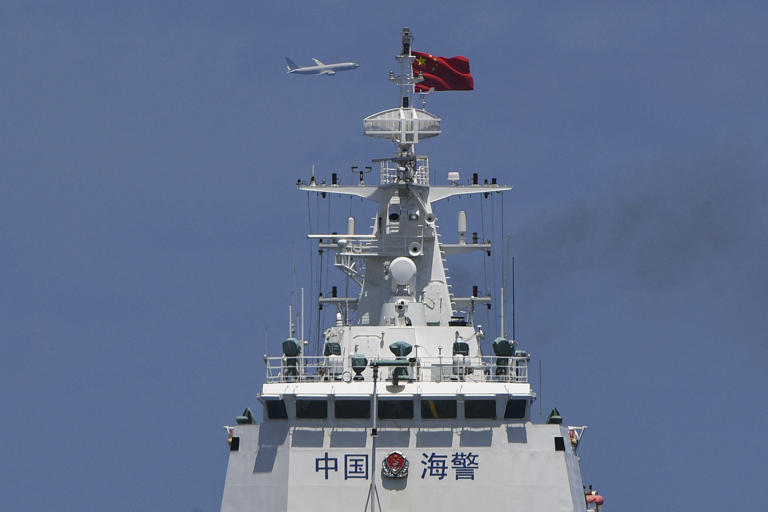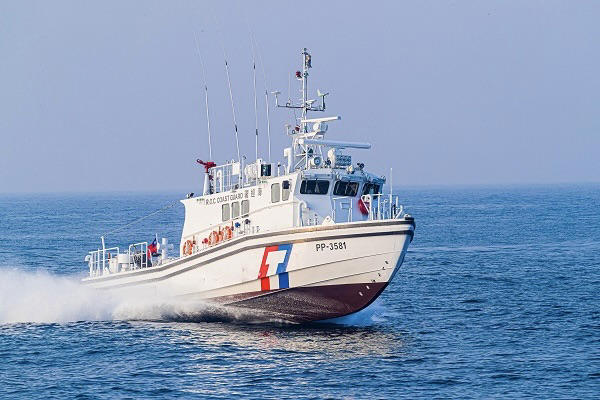John Feng
China this week doubled down on the legitimacy of its intrusive maritime patrols around a group of Taiwanese islands just off the Chinese coast, heavily fortified but isolated territories that were once shelled during the Cold War.
The waters around Taiwan's front-line Kinmen islands, just 6 miles from China's shores, have been probed by the Chinese coast guard for two weeks, part of a new normal that experts say is designed to undermine Taipei's authority, but which could also lead to a crisis if all parties do not show restraint.
Earlier this month, Beijing said its maritime law enforcement vessels would provide security in the waters surrounding Kinmen. This followed the deaths of two Chinese fishermen when their speedboat capsized while trying to out-run Taiwan's coast guard. Two other fishermen were injured in the incident that Taipei described as deeply unfortunate.
In spite of the Kinmen's proximity to China's coastline, Beijing's decision to enter the waters around the archipelago broke a decades-long understanding about prohibited or restricted maritime zones, the Taiwanese government said.
On Wednesday, Beijing's Taiwan Affairs Office (TAO) spokesperson Zhu Fenglian described the area as a traditional fishing ground for people on both sides of the Taiwan Strait and said the declared boundaries do not exist.
Zhu also dismissed Taipei's concerns about the Chinese coast guard's unusual decision to board and inspect a Taiwanese tourist boat this month.
Kuan Bi-ling, head of the Ocean Affairs Council that oversees Taiwan's Coast Guard Administration, said a day earlier that China's patrols, although short in duration, had "political significance," likening them to now routine intrusions around the Japanese-controlled Senkaku Islands, which Taipei calls Diaoyutai and Beijing claims as Diaoyu.
The Chinese Foreign Ministry does not directly comment on relations with Taiwan, which Beijing considers a domestic matter because of its territorial claim to the island. The TAO did not respond to multiple requests for comment.
Che-chuan Lee, a research fellow at the Institute for National Defense and Security Research, Taiwan's top military think tank, said China "took advantage" of the Kinmen incident in a bid to gradually deny Taiwan's de facto jurisdiction.
China's erasure of the status quo has been slow but firm; once its forces normalize their presence in an area, they very rarely withdraw.
In three and a half years, Chinese military aircraft have flown nearly 5,000 sorties into Taiwan's air defense zone. Many already consider the Taiwan Strait to be in a state of crisis, marked by the steady encroachment of Chinese warplanes and warships into the waters and skies around Taiwan.
"The status quo across the Taiwan Strait has changed significantly due to China's unilateral gray-zone tactics," Lee told Newsweek.
The next step could be encroachment into Taiwan's territorial waters, just 12 nautical miles from land.
"If that becomes routine someday, Taiwan will become an undefendable island," he said.
Lee believes the seizure of Taiwan's outlying islands by China is unlikely. Such a move would "arouse the anger of the majority of the people in Taiwan and accelerate Taiwan's ongoing military reforms and all-out defense campaign."
"Cross-strait hostility will become a reality," he said.

A U.S. Navy P-8 Poseidon maritime patrol plane circles past a Chinese coast guard ship present during a resupply mission by a civilian boat chartered by the Philippine navy to deliver supplies to an outpost in the disputed South China Sea on August 22, 2023.
The flare-up around Kinmen may blow over after a period of sharp rhetoric, or it could give way to Beijing's particular type of muscular territorial assertions that have been felt elsewhere across the region.
Whatever the case, the involvement of the People's Liberation Army (PLA) is expected to be limited, and any action short of an invasion is likely to be led by the Chinese coast guard, said Tom Shugart, an adjunct senior fellow at the Center for a New American Security, a Washington think tank.
"Last year, 22 PLA Navy corvettes were transferred to the China Coast Guard, painted white and had some of the bigger weapons systems taken off. Clearly, China is quite serious about continuing to expand what is at this point already the largest coast guard in the world," Shugart told Newsweek.
"If we ever saw a blockade of Taiwan—they would call it a quarantine—the face of that quarantine would probably be the white hulls of the China Coast Guard and the Maritime Safety Administration," he said.
"Any major conflict the PLA gets involved in, they likely want to do on their timetable. I don't think they want to get into a conflict on the back foot, reacting to an accidental event," said Shugart. "Better to gradually eat away at the sovereignty of Taiwan over time than to risk an all-out military conflict."

This undated photograph released by Taiwan's Coast Guard Administration shows one of the agency's 35-ton coast guard patrol vessel, which were seen this month facing off with larger Chinese coast guard ships in the waters around the Taiwanese-controlled Kinmen islands.
The United States—China's principal rival and Taiwan's main security partner—sells arms to Taipei under the provisions of the Taiwan Relations Act, whose text alludes to the possibility of a Chinese blockade, but one that affects Taiwan proper and its nearby Penghu islands, rather than other outlying territories.
The 1979 law makes it U.S. policy to consider a quarantine of Taiwan "a threat to the peace and security of the Western Pacific area and of grave concern to the United States," but it does not cover Kinmen, said Bonny Lin, director of the China Power Project at the Center for Strategic and International Studies think tank in Washington.
"The TRA does not state specifically what the United States would do in this context, but provides a basis for U.S. leaders to act in support of Taiwan in such scenarios," Lin told Newsweek.
A U.S. State Department spokesperson did not address a question about Washington's options under the TRA, but said: "We are aware of the reports and closely monitoring Beijing's actions."
"We continue to urge restraint and no unilateral change to the status quo, which has preserved peace and stability in the Taiwan Strait and throughout the region for decades," the official said, urging Beijing to "engage in meaningful dialogue with Taiwan to reduce the risk of miscalculation."
"The United States shares with other countries an abiding interest in peace and stability across the Taiwan Strait and in the broader Indo-Pacific region, which impact global security and prosperity," the department said.
No comments:
Post a Comment